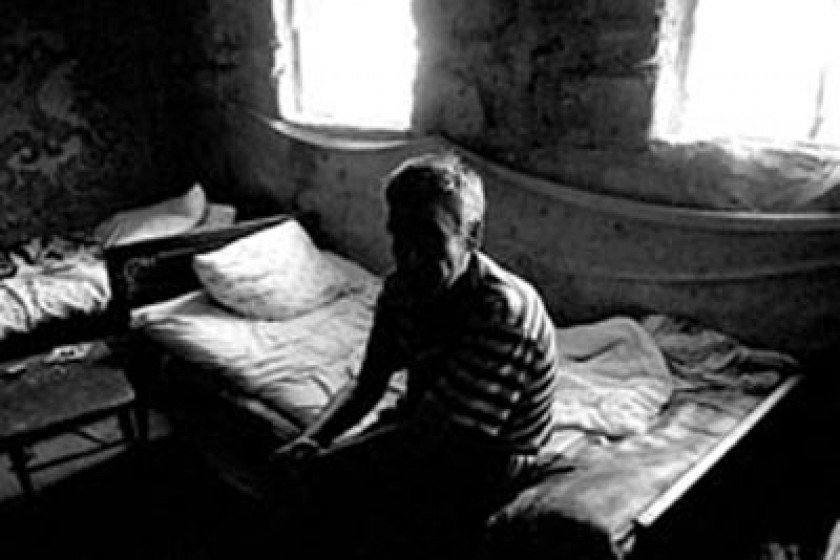
"I'm dying but they won't give me my medicine."
Aram Martirosyan lives in a suburb of Yerevan . He is fifty years old and has been suffering from tuberculosis for twelve years now. A driver for twenty years, Aram receives a pension of 4,000 drams a month. He shares his apartment with his mother, sister, and nephew. The nephew has been infected with tuberculosis, too. We met with Aram when he had just been released from the Abovyan Republican T.B. Hospital . He had spent fifty-four days there, the standard duration of one course of treatment. After leaving the hospital he was supposed to continue to take medication, but he couldn't afford to, as his pension is not even enough for a loaf of bread a day.
"If I buy medicine it will cost me 4,000 drams a day. Just figure out how much that comes to per year. How am I supposed to pay for it? I had a beat up old car; I sold it. I'm missing one lung, and I only have half of the other one left. What should I do? I just have to bear it for a few months and then die," Aram said, hopelessly. He also told us about what really goes on at the Abovyan T.B. Hospital . Even there, Aram was unable to get the medicine that was supposed to be his free of charge. "They would sign the medicine out in my name and then sell it to me. If only they had the conscience to charge me 400 drams instead of 800."
Surprised, I said that these were free drugs, and wondered how they could have charged him, since this was considered to be a good hospital.
"But if there is no drugs, why is it so good? They signed out the drugs in my name, but I didn't get them-I bought most of them. It cost me 180,000 drams. How am I supposed to pay? I have been sick for twelve years and haven't worked in all those years. My eighty-year-old mother has to take a pair of socks, go to a village to sell them, to get a loaf of bread for me. And the professor at the hospital tells me, 'Next year the situation will improve; we will have medicine.' I am not sure I'll be alive next year to get the medicine; they have it now and they should give it to me now. Even if they give them at their real cost, at the price they are sold in Russia . They give me injections twice a day; it costs me 2,400 drams. I pay 900 drams for three ampoules of pyrazinamide , 400 drams for the other drug, plus the needle, and the nurse's charge, so figure out how much it comes to."
"There is one drug, half of which I bought at the price of 800 drams, and the other half at of 1,200 drams. I asked Edmond , a department head at the hospital, 'Why don't you tell the director?' 'What should I say? He would tell me that there is no medicine. I can't tell him that he has the medicine and should give it to me.' Then he said: 'You know there is a guy who has the drugs, buy them from him.' So the second time I brought the drugs from another patient," Aram continued.
I asked him why he didn't complain to the head physician. "To tell him that they signed out those drugs in my name, then what? Only this doctor deals with these issues; if I fall out with him, what am I going to do? It's warm there; I go to the hospital in wintertime. Let me tell you something, they might not let me in, might not let me stay there over the winter."
I asked him, "So if we write about all these things, they might not let you in?" Aram told me, "If you want to write about it, go ahead. If they don't let me in, let them do that. Our people weren't always like this. I had a job in Russia ; why did I come back? I'm dying but they won't give me my medicine, just to prolong my life for a year. Even if they give it to me for a lower price, anyway they get it for free. If they charged me 400 drams I would live for a couple more years."
I told Aram that various international organizations implement projects to fight against tuberculosis and asked whether he had ever met with them. "A couple of people like you came. They talked in a foreign way, took some pictures and left. I didn't understand why. They come and go but what has changed in my life? Nothing. Who cares about us? We pay even for a syringe- 50 drams. When you ask them for a needle, they say they don't have any. Then the nurse brings them and sells them to you. I bought 120 ampoules of Amicacine - half for 800 drams and half for 1,000, you just calculate."
After receiving his treatment at the hospital, Aram 's condition improved. To pay for it, Aram sold his old car, and his sister sold her two piglets. Now they have no more money, and no possibility for further treatment. "When I receive treatment I feel better. If I continue it will help, but how can I continue?" Aram Martirosyan asked.
P.S. This article was complete when we learned that Aram and his nephew are again undergoing a course of treatment at the Abovian Republican T.B. Hospital. In order not to cause problems for him, we have changed his name.
Photօ by Onnik Krikorian
 Videos
Videos Photos
Photos




Write a comment